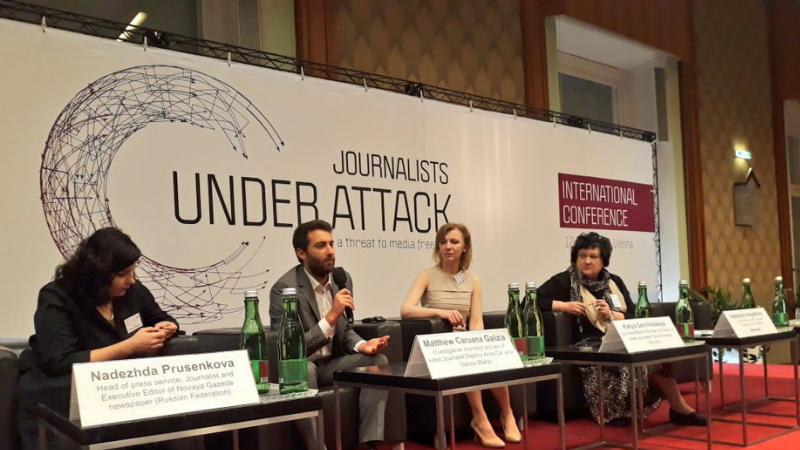“With the systematic denigration of the press, more and more people now consider it acceptable to attack the messenger because they don’t like the message; to silence a journalist for being too critical, or for speaking the truth.”
This was the message of the OSCE representative on Freedom of the Media, Harlem Désir, at the start of a conference being held today on the safety of journalists.
It included among its keynote speakers Matthew Caruana Galizia, the son of Maltese journalist and columnist Daphne Caruana Galizia, who was killed in a car bomb a few metres away from her home on 16 October, 2017.
The Maltese journalist’s assassination is referred to as one of “the most horrifying examples” of attacks against journalists. It continued after her death, with others including Ján Kuciak and Jamal Khashoggi that served as a “sobering reminder” of the risks faced by many media workers today.
The one-day conference being held in Vienna, entitled, ‘Journalists Under Attack: A threat to media freedom’, is a response to the increasing risks to journalists globally. It brings together a number of journalists and press freedom advocates.
Apart from Caruana Galizia’s son, other speakers include Peter Bardy, the editor of news portal Aktuality, for which Kuciak worked. Pauline Adès-Mével, Head of the EU and Balkan desk at Reporters Without Borders, and Sarah Clarke, Head of Europe and Central Asia at Article 19, as well as Nadezhda Azhgikhina, Vice President of the European Federation of Journalists were also among the list of speakers.
The OSCE Head of Media Freedom stressed in his speech that when journalists were targeted, it was everyone’s freedoms at risk.
“It is not only journalists that are attacked but the very foundations of freedom and democracy; it is the role of the press to hold those in power accountable (…) When journalists are targeted, it is everyone’s freedoms which are at risk,” Désir said.
"It is not only journalists that are attacked but the very foundations of freedom and #democracy; it is the role of the press to hold those in power accountable (…) When journalists are targeted, it is everyone’s freedoms which are at risk" @harlemdesir #journosafe
— OSCE media freedom (@OSCE_RFoM) April 12, 2019
A total of 170 cases of physical or verbal attacks, as well as threats and instances of harassment were reported on journalists in the OSCE region between July and November 2018.
The OSCE called upon governments to “end impunity for crimes committed against journalists” and urged them to “refrain from intimidating, threatening, or condoning – and to unequivocally condemn – violence against journalists”.
The OSCE noted that journalists working in democratic societies were living in an ever-increasing climate of fear. With more and more journalists being “harassed, intimidated, abducted, interrogated, arbitrarily detained and/or imprisoned, or even killed for the work they do”.
Importantly, the OSCE underlined “the importance of investigative journalism… including in holding public institutions and officials accountable”.
A proposal was put forward for the establishment of national committees with representatives of the prosecutor’s office, police and journalist associations to verify that attacks and threats against journalists were investigated, procedures improved, protection offered with the aim of reinforcing journalists’ security.
“I want to thank all threatened and attacked journalists who have joined us today, incl. @mcaruanagalizia, @OliveraMN, @t_felg, Nadezhda Prusenkova @novaya_gazeta , @PBerizzi & @Charlie_Hebdo_ Riss, because we know what they have endured and their courage in pursuing their work”
— OSCE media freedom (@OSCE_RFoM) April 12, 2019
Allowing aggression against journalists, and permitting those who kill them to “get away with it” amounted to a second crime against victims, the OSCE said.
Last December, in Milan, the OSCE Ministerial Council along with all Member States adopted a decision on the safety of journalists, which highlighted various challenges faced.
The decision included 10 recommendations for strengthening national data collection, analysis and reporting of attacks on those working in the media.













